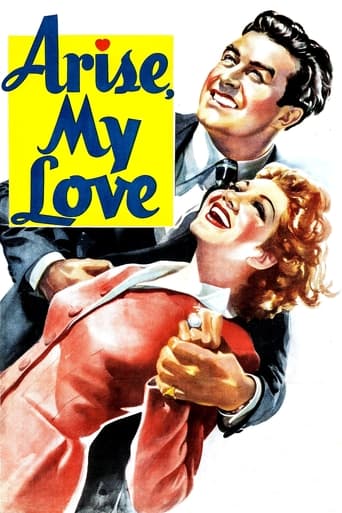

Mitchell Leisen gets superb performances from CLAUDETTE COLBERT and RAY MILLAND in ARISE, MY LOVE.It's a comedy/drama with Claudette as a journalist tired of covering fluffy stories who decides to get into serious journalism by rescuing a man about to be executed during the Spanish Civil War (Milland) so that she can be the first writer to get a scoop on a great story. As soon as she and her prisoner meet, the deft comic timing of these two pros are given great support from Billy Wilder's clever script. Early on, there's a scene of mistaken intentions that has Ray thinking Claudette wants to seduce him. He's oblivious to the fact that she merely wants to take some photos of him for the article she intends to write. The double entendre dialog has seldom been matched, in this scene alone.Personally, I prefer "Midnight," another Leisen/Colbert film shown before this one on TCM. It's even wittier and much funnier. The trouble with ARISE, MY LOVE is that it attempts to do too many things at once and emerges as an uneven romantic comedy with a war background. For the ending, Claudette gets to deliver a flag waving speech that is obviously meant for 1940 audiences who were facing the prospect of getting involved in WWII.Lots of laughs along the way with both stars delivering excellent performances.
... View MoreThis is a good movie, full of snappy lines, very capable acting and interesting scenes. Mitchell Leisen has an above average script to work with, and when this happens you can be assured of a very watchable movie. Well worth a DVD release (can you hear me Universal!), but this inexplicably has never even made it on to VHS.It features a strong capable woman (a trademark Leisen feature), but her male counterpart is no weakling is either, Ray Milland matches Claudette Colbert all of the way, helping create dramatic interest. The last section of the movie after the sinking of the Athenia is a bit underwritten and slightly unconvincing, but this is only a minor quibble.Very well worth watching.
... View MoreThis film is pretty good but oddly uneven. The script (which Charles Brackett and Billy Wilder both worked on) is about the adventures and experiences of soldier-of-fortune Ray Milland and reporter Claudette Colbert across western Europe from Spain to Germany and then to England. Colbert is working for an American syndicate out of Paris that is headed by Walter Abel. She goes to Spain, where the Spanish Civil War is ending with a Fascist victory. Milland is going to be executed (he's been fighting for the Republic), and Colbert tells the prison governor (George Zucco) that she is married to Milland. She is allowed to see Milland, and helps spirit him out of the prison for the sake of the interview and scoop. They get to France, and Milland proceeds to romance and slowly win Colbert. The rest of the film is done against the background of the worsening international crisis, seen first hand by our hero and heroine. Colbert does not like the Nazis, but she is slower on the realization that they are not limited in their goals but determined to spread control over as many peoples as possible. Milland (when not trying to break down Colbert's "friends only" point of view) is showing her the ropes of the real German led threat to Europe and the globe. The unevenness (despite having Wilder and Brackett working on the screenplay) is due to the nature of the light banter between the romantic leads, and the growing threat they observe. It is not a glaring weakness, but it seems to split the film in half at times.Sometimes it has a belated effectiveness in carrying out the warning of the movie. Abel is all business and hectic confusion (Esther Dale, as his secretary, helps keep him directed to his purposes) in sending Colbert to her jobs and getting her stories back to the U.S. At one point we find Milland and Colbert in Paris, with the latter doing his best to get Colbert to loosen up - taking her to Maxim's and other romantic nightspots in that city. It does eventually wear down her resistance to him. But late in the film it is June 1940, and Abel is on hand to see the entrance of the victorious Nazis into Paris. He has a very good moment when his business viewpoint dissipates in shock as he realizes the "city of lights" is in the hands of these modern barbarians. His comments at that moment make us think back to the brighter Paris we saw earlier in the sequences at Maxim's.*(*A curious sidelight: Although from different studios, the events of that June day play a role in Paramount's ARISE, MY LOVE, and Warner's CASABLANCA: Bogart and Dooley Wilson flee Paris (to avoid arrest from the Germans) by train, and Bergman deserts Bogart (to return to the wounded Paul Henreid) at the same time that Abel is watching the arrival of the same German troops.)Despite the unevenness the film is worth seeing. It has many good moments in it (including an unexpectedly bumbling Zucco - his usual evil control of events thwarted by his act of kindness to the pretty Colbert). It is also, as far as I know, the only movie to mention a forgotten war crime of the opening of the war: the torpedoing and sinking of the steamer Athenia off Ireland with loss of life. The incident (in September 1939) is not as recalled as the similar Lusitania incident of 1915 in the same waters because the losses were not as huge (fortunately). Oddly enough the Nazis were quick to be aware of the similarity, and the Goebbels propaganda machine cranked up a story that the British were responsible, not the Germans. Nobody believed it then or since.Despite it's somewhat split personality the film gets an "8" out of "10".
... View MoreIn the final analysis, a film is about cinematography. From the very beginning at the Spanish prison, extraordinary cinematography is used to an exceptional degree, and it continues through the film. There are minor exceptions, as with the file film of airplanes flying. More importantly, the film claims the obvious: The Spanish government in 1939 had more than casual leanings toward Berlin. The bombing of Guernica by the Nazi air force is testimony, here reinforced. Tom Martin (Ray Millard) says he had a pet rat in his jail cell named "Adolph." Spain's neutrality during World War Two is in question with Paramount Pictures, as it was in diplomatic circles. Of course, a 1940 movie about event of 1939 has the advantage of historical retrospect, yet the public actions of the Spanish government stand. Claudette Colbert as Agusta Nash is the career woman whose career comes before love, who puts her career before all. Her assignment as Special Berlin Correspondent is to tell of Hitler and his gang. A series of unpredictable events leads her to redefine her sense of patriotism. There are, in effect, many loves which must arise and spite the envious moon. Cinematography, historical theme, and some darn good acting all unite for an effective historical perspective on life at the beginnings of World War Two.
... View More